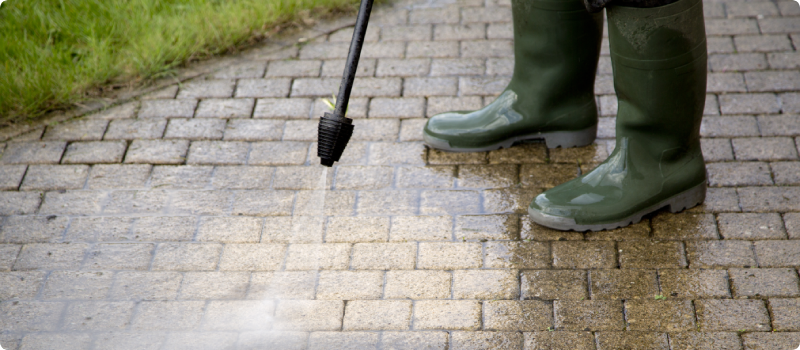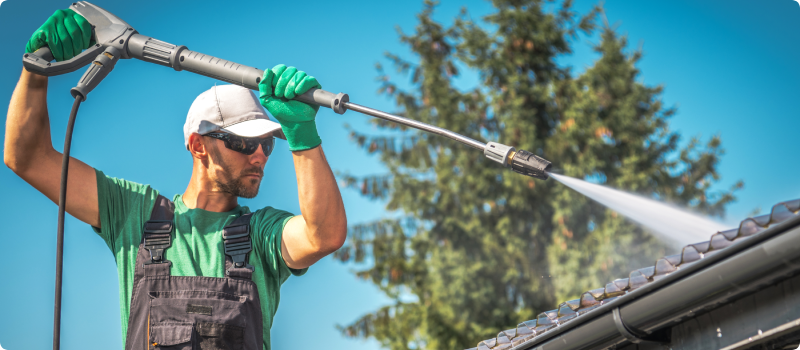Power Washing & Pressure Washing
Updated March 4, 2024 . AmFam Team
If you’ve ever wondered what the difference is between pressure washing and power washing, you’re in good company. Both seem to do the job of spraying water at high pressure, so what gives? The main difference is that power washing uses highly pressurized steam to do the cleaning while pressure washing just uses unheated tap water, without the help of a heating element.
The temperature of the water that power washers wield can have a big impact on cleaning — and if you’re not careful, you may damage the goods you’re trying to clean with that high-temperature steam.
So, if you’re thinking about spraying down the exterior of your home to give your siding new life, take a look at these tips. To help you make the right call on what system to use --- and when --- we’ve put together this review of pressure washing applications. And we’ve included key details on when an upgrade to power washing may be the better answer.

What is Pressure and Power Washing?
Typically used to deep clean hard surfaces like bricks, concrete or siding, pressure washers are a household tool that many are using to help keep their homes looking great. By quickly stripping away built-up dirt, mildew and grime, both power washers and pressure washers have helped homeowners save on time and cleaning costs.
Pressure Washing Nozzles and Cleaning Applications
Before you begin working on your home with a pressure or power washer, you need to get familiar with the various types of spray nozzles. The angle/degree of the spray is usually how they’re classified, and relates to the “fan” of water spray that they emit. Of note: you can get hurt using any power washer, so be sure to power wash with caution and control when handling pressure or power washers.
Turbo/rotary nozzles. This 25° spray head is a really versatile option because it combines the force of a tight-spraying fan of water with a fast-rotating cone. Pulsating anywhere from 1,800 to 3,000 RPMs, this nozzle’s great for deep cleaning hard surfaces.
65° black-tipped soaping nozzle. When you’re fortifying your clean water with detergent, this is the nozzle to use. Gently soap up the surface with an add-on cleaning solution and wash your car or bike with this nozzle, then switch to a different head to rinse.
0° red-tipped jet nozzle. Basically a water laser, this is one powerful jet and should be used with extreme caution. Used to pull caked-on dirt off of construction tools and strip away rust on equipment, this nozzle won’t likely see a lot of use around the house. Is pressure washing bad for your house? It can be if you’re using the wrong nozzle.
15° yellow-tipped jet nozzle. This is a great nozzle for preparing and cleaning dirt off of hard surfaces before painting. After a week in the weeds and the mud on your ATV, use this nozzle to get your ride looking great again.
25° green-tipped jet nozzle. Used commonly around the house to wash the car or rinse off the siding, this nozzle is great for adding new life to your boat, driveway and patio furniture. It sprays out a sheet of water to cover a larger surface area, making cleaning faster than the more precision nozzles.
40° white-tipped jet nozzle. You’ll notice that the wider the angle, the more mist you’ll get from the jet at a distance. The 40° nozzle sprays a powerful mist of water that’s ideal for cleaning exterior windows, brick houses and wood siding.

Power Washing Costs and Pressure Washing Rates
Even if you don’t own a power washer or you’re not up to getting the job done yourself, you have options. Your home can still get sparkling clean when you hire a professional power washing group.
Most professional power or pressure washing groups will bill you either by the job or by the hour. You’ll also find that they’re likely to add a surcharge for detergents used or special treatments.
The average labor cost for pressure washing is around $50 - $160 per hour for professionals. Most groups will use industrial-grade electric pressure washers for domestic washing jobs.
And the costs for power washing are usually billed on a per-square-foot basis, ranging from $0.30 - $0.80 per square foot to clean your home. These systems are usually gas powered and use very hot water or steam.
Here’s a list of some power washing services and the average costs for each:
- Spray out gutters: $50 - $150
- Remove mold and mildew from vinyl-sided homes: $170 - $360
- Clean up pavers or concrete: $100 - $270
- Remove moss from roof: $250 - $600
- Clean up decks and patios: $120 - $250
- Wash down fencing: $150 - $300
If they’re connecting to your water supply through a garden hose, you can expect them to spray out about 10 - 15 gallons of water per minute. Take a look at your water bill to get a price per 1,000 gallons rate. So if you’re paying around $5 per 1,000 gallons, and you spend 6 hours spraying down your drive way and walkways, expect to pay about $30.00 in water fees when the bill comes due.
Managing the upkeep on your home’s exterior can help improve its curb appeal and can really improve your quality of life. With clean windows, freshly washed siding and gutters that will work well when the rains come, having a power or pressure washer on hand can help you keep your home looking great for years to come.
While you’re considering your clean-up options, remember to check in with your American Family Insurance agent. You’ll have a chance to update your policies. And your agent can even help you find ways to save on your premium, like using the MyAmFam App for going paperless with your policy documents and billing statements, available for download via Google Play or at the App Store.
This article is for informational purposes only and based on information that is widely available.



